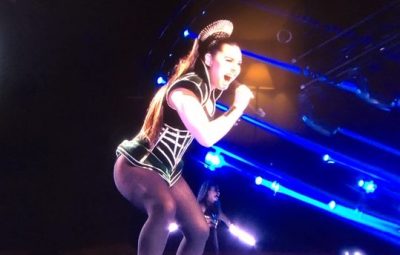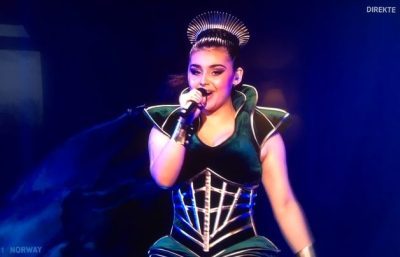They all sing to win, but Norway’s contestant in this year’s Eurovision Song Contest claims she’s “extremely satisfied” with her 5th place in the extravaganza’s final during the weekend. It was Norway’s best showing in 10 years.

“I’m absolutely delighted,” Alessandra Mele told Norwegian media after the European Broadcasting Union’s marathon show that ran for more than four hours on Saturday night. It was broadcast live from Liverpool this year: Ukraine won last year but wasn’t able to host it this year because of the war Russia started. The UK stepped in so the show could go on, punctuated throughout by demonstrations of support for Ukraine, solidarity among Europeans and gratitude from Ukrainians.
“We’re in a year when we’ve written history regarding women,” said the artist known simply as “Alessandra.” She was referring to how Loreen of Sweden became the first woman to win Eurovision for the second time, “and I’m proud of that.” She also claimed that her own song, called “Queen of Kings,” also handled on such pride and power for women.
Alessandra’s performance didn’t impress the professional juries from all the nations competing in Eurovision, which only gave her 52 points. The points tallied in connection with votes from the public, however, gave her 216 points, landing her in 5th place when it was all over.
That compared to 583 points for Sweden’s Loreen, who won the juries’ votes by a landslide but didn’t score as well with the public. Finland ended second, with 526 points, followed by Israel with 362 and Italy with 350. Norway’s ended just ahead of Ukraine’s entry this year, which also won public support and 243 points.

There’s been some criticism over how points are awarded and few know who actually sits on the professional juries. Norwegian Broadcasting (NRK) reported on Sunday that Norway’s jury is made up on five people, all of whom are connected to the music industry and charged with judging the composition and originality of the new songs performed, the quality of the artist’s performance of the song, his or her vocal capacity and an overall impression of each country’s entry. Jury members are sworn to secrecy over their identies and deliberations, and overseen by a member of the police who verifies their results before forwarding them to the European Broadcasting Union (EBU).
Alessandra, a 20-year-old Norwegian-Italian, actively promoted her own entry on social media, said that she personally thinks the public’s votes are the most important. “A jury can be a bit picky, and do they know more than the public?” she said. “It’s the people who know what’s best for the soul.”
Given her Italian roots, Alessandra had joked before the contest began last week that she expected a full 12 points from the Italian jury. She ended up with zero points from Italy, but clearly won more from its people.
“Now the job is done and a big dream has been fulfilled,” she told NRK. “I look forward to celebrate with my team and relax a bit before the adventure continues.” She’s been studying in Lillehammer and will also be returning to school and working with music.
NewsinEnglish.no/Nina Berglund

